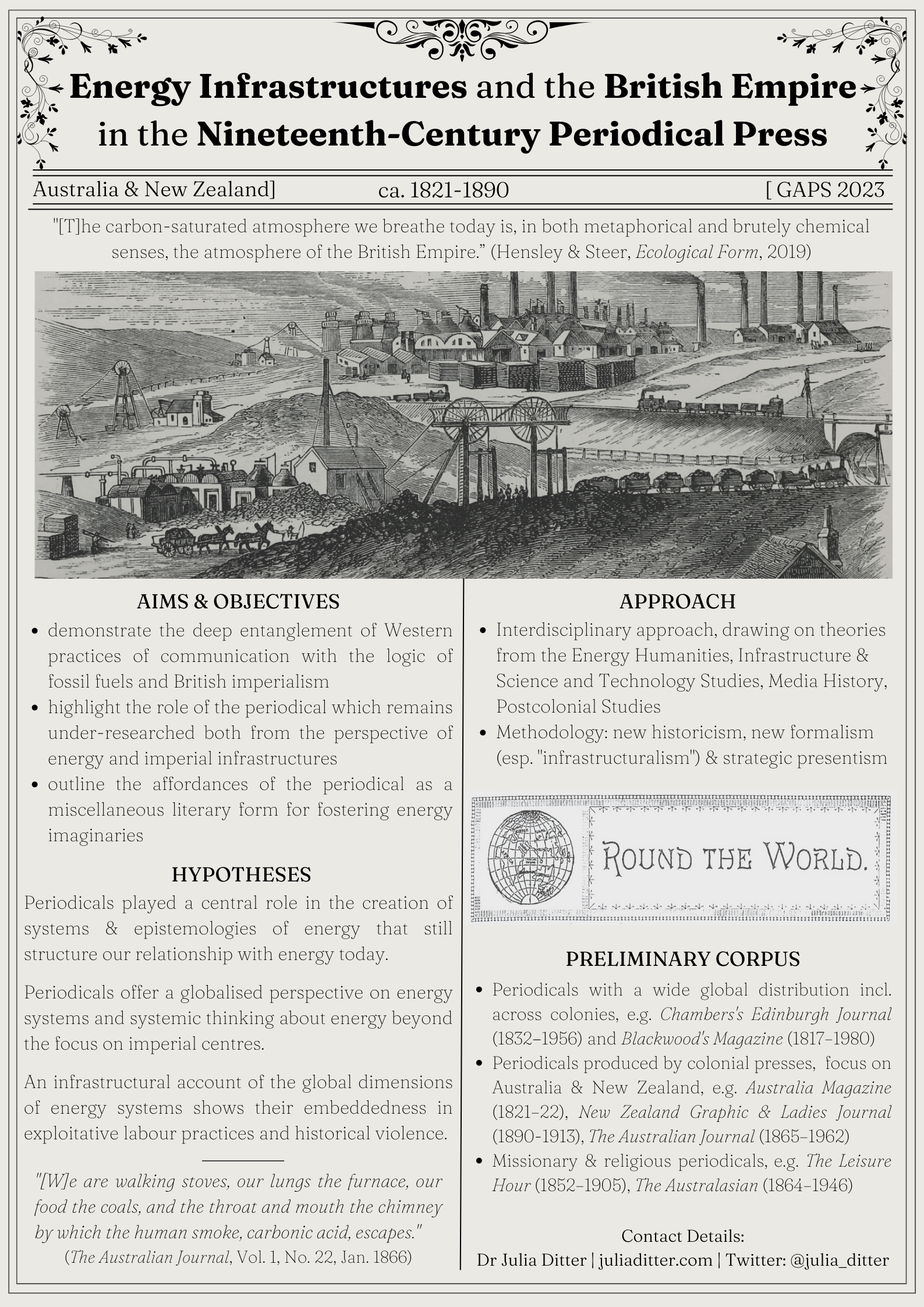This project examines representations of energy infrastructures in the Anglophone periodical press of the nineteenth century, focusing in particular on British and Antipodean periodical publications. In a world grappling with a complex intersection of crises, the persistent reluctance of countries, in particular those in the global North, to end their dependence on fossil energy feeds into at least two interrelated crises: an environmental crisis tied to the carbon emissions resulting from the use of coal, oil and gas to warm homes and feed industries, and an energy crisis tied to questions of energy stability and injustice at a time of geopolitical instability, finite resources and infrastructures that are vulnerable to breakdown because they rely on the illusion of an inexhaustible supply of fossil energy sources. The humanities provide urgent questions and modes of inquiry to address these crises, both from an environmental and a social perspective (Wenzel 2016, Boyer and Szeman 2014). The consequences of the Western world’s dependence on fossil fuels are becoming ever more visible, underscoring the urgent imperative to adopt more sustainable and responsible energy practices and a widespread transition away from fossil fuels. And yet, as Boyer and Szeman (2014) put it, political actors and citizens alike are stuck at an impasse, seemingly incapable to put this knowledge into action and bring about the much-needed energy transition. The energy humanities respond to this impasse as a new field of research that tackles the energy question from a humanities perspective because, as the Petrocultures Research Group argues, the question of energy “is, at its core, a human question” (Szeman et al. 2016, 13). Transition, they argue, requires a deeper understanding of “our social, material, and affective attachments” to these resources (15). My project contributes to the endeavour to understand the social, material and affective foundations of the (Western) reliance on fossil fuels by examining another age of energy transition, the nineteenth century, and exploring the foundations of dominant understandings of fossil energy. Through a reading of the mass medium of the periodical press, I examine the role literary and cultural production play in mediating energy transition and reflecting on the process through which fossil fuels have come to form the energetic and ideational infrastructure of our lives in the West: from institutions, political systems and global networks to cultural practices, social formations and literary forms.
Historical perspectives are indispensable for understanding the social, economic, and political commitments to fossil energy that structure our lives in the present. The nineteenth century in particular promises insights that foster a better understanding of the social, cultural and literary dimensions of transition because its “coal-powered industrialization […] sparked the largest energy transition in human history” and created the foundation for a society reliant on fossil fuels (Szeman et al. 2016, 21). The legacy and the continuing influence of nineteenth-century Britain’s energy infrastructure on today’s global crises – not just in a technical but also a material, economic, social, cultural and literary sense – highlight the need to revisit the energy imaginaries of the nineteenth century to gain a better understanding the socio-cultural politics of energy today. For these reasons, the last decade has seen an increase in research into the energy systems of the nineteenth century with a predominant focus on the industrial novel (Gold 2021, Miller 2021, Taylor 2016, MacDuffie 2014). The Anglophone periodical press, however, remains vastly under-researched from the perspective of the environmental humanities in general, and the energy humanities in particular. Without an adequate appraisal and analysis of what has been described as “the age’s defining genre” (Saintsbury 1896), however, an understanding of the nineteenth-century’s energy systems remains incomplete. In undervaluing the role of the nineteenth-century’s “mass media”, the periodical press (Shattock and Wolff 1982, xiv), in favour of sources that are deemed more ‘literary’, a more diverse understanding of energy systems that cuts through all social strata of nineteenth-century society is being eclipsed.
My project, Energy Infrastructures and the Nineteenth-Century Periodical Press, remedies this gap by addressing the pivotal role of the periodical press in the creation of energy infrastructures, or ‘systems’, and energy epistemologies that continue to structure relationships with energy globally today. The periodical press provides access to a kind of literature that addresses a wide range of audiences and markets through its miscellaneous mixture of factual and fictional modes of writing and by crossing geographical and social boundaries. To do justice to this diversity, I will examine the formal and discursive mediation of energy infrastructures in periodicals that were affordable, broadly circulated and targeted at a wide range of audiences in terms of class, gender, level of education, and/or political attitude. This includes, amongst others, The Leisure Hour, Chambers’s Edinburgh Journal, All the Year Round and The Penny Magazine. Periodicals published in the Antipodean British Empire will further allow me to demonstrate the vital role of the periodical press in enabling and structuring the global imagination of energy systems, or indeed of energy as a system in the first place. I argue that the periodical, as a ubiquitous medium and a miscellaneous textual and material form in which scientific and popular forms of knowledge, styles and registers collide, affords an ideal object of analysis for gaining an understanding of popular imaginaries of energy and its infrastructures. To demonstrate this, I approach periodicals through an inter- and transdisciplinary perspective and combine close and distant reading practices by reading laterally across periodical titles. This will allow me to highlight the hegemonic struggle of public opinion, popular knowledge and cultural imaginaries that characterises literature and mass media in the past and present. This historical perspective provides an important contribution to the understanding of public attitudes as well as communicative, rhetorical and literary-cultural strategies that will be of particular value for the realisation of new energy futures.
Related publications:
2024. “‘In the Midst of Smoke and Flame’: Extraction Ecologies and Industrial Tourism in the Nineteenth-Century Periodical Press.” Anglia 142 (1): 11-28. https://doi.org/10.1515/ang-2024-0002
The poster below provides an initial overview over a section of the project on energy infrastructures and the British Empire.

Featured Image by Bence Balla-Schottner
